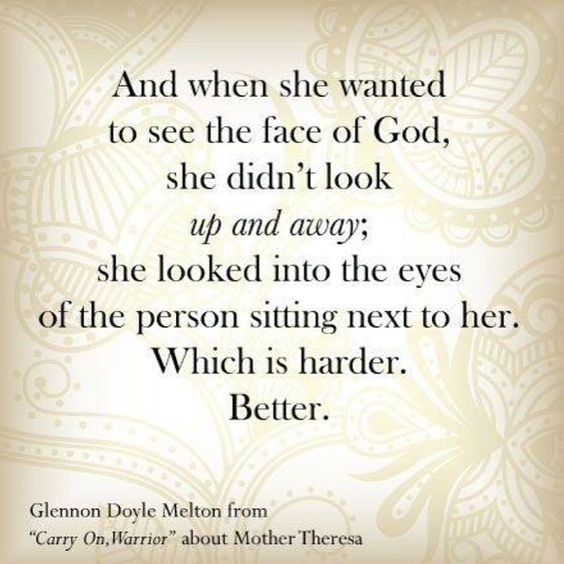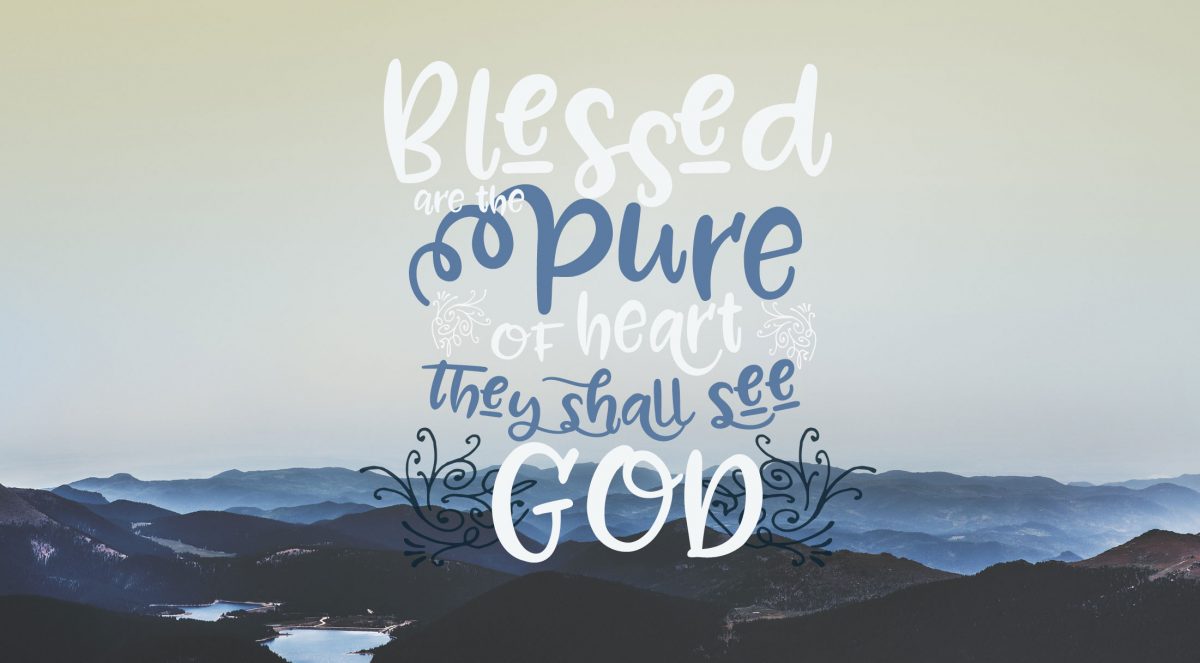Lenten Devotional-Sat, Mar 20: CHILDREN of GOD
All along, we’ve meditated on the idea that these blessings are given to all of us. That in this ‘upside down’ version of the Kingdom of God, people who might not have been recognized as being valuable, became significant in the sight of Christ and the eyes of God. It’s as true today as it was when these blessings were written down almost 2,000 years ago.
Of course, Jesus lived his life by demonstrating that the tenets of his own faith — Judaism — already prioritized compassion for people on the edges of a community: widows, orphans, strangers and others who could be overlooked due to their lack of status and power. He lived the values he had been taught by his own faithful parents. He modeled those values for his disciples.
What does that look like? He ate meals with outcasts who might be considered traitors to their own people, such as tax collectors who had authority but worked for an oppressive regime. He healed untouchables. He let questionable people come near to him, when his friends tried to keep them away. He fed people. He accepted invitations into the homes of socially-isolated folks. He argued with the best scholars and lawyers and spiritual teachers of his day. He picked rough working-class friends as his companions for the road. He found respite in the homes of women like Mary and Martha. He defended people accused of wrongdoing. He spent time with among people struggling with undiagnosed illnesses ranging from epilepsy to mental health conditions. He gave his time and attention to people who lived on the margins.
Jesus described, in the Beatitudes, people who lived on the outskirts of any community. By his recognition, he drew them—and continues to draw us—into the center of God’s kingdom.
To be called a peacemaker, and then to be embraced as a child of God, is to be welcomed into kinship and connection to a holy family. It is to be adopted and called beloved.
All of us, it is likely, have found ourselves living out one of these beatitudes or another. They aren’t an equation for how to live perfectly. They’re a description of the here-and-now, deep down in the raw reality of being human, and what that looks and feels like.
At some point, we have reflected one or more of these conditions. We have been hungry and passionate. We have been poor and stubborn. We have believed without reason and become desperate enough to let others help care for us. We have hoped when it was hard to go on. We have seen something holy and sacred in other people, even when it might be difficult. We have responded to hate with love, to discord with curiosity.
We’ve been amazing and strong and creative and compassionate. We have also messed up. We have, as often as not, gotten our living and loving wrong.
Yet the wonder of the blessing is that it isn’t offered to perfect practitioners of peace-making or the other characteristics described in the Beatitudes. Jesus doesn’t expect us to have everything all figured out. We don’t have to check off all the boxes or to qualify for some special degree of sainthood.
This blessing is for the peace-makers. It’s for people like you and me. People, like us, who are works-in-progress. We’re living our lives, imperfectly and messily, with a yearning for something more, a marrow-deep, soul-stirring desire to connect to Godself. We want more love than indifference, we want more peace and healing than hate and hurt.
You. Me. Us. We are the mixed-up, messed-up, trying-to-get-it-right children of God. — Rev Gail
MEDITATIONS:
I am to be loved, honored and respected solely because I exist … I am a beloved child of God after all. ― Emmanuella Raphaelle
As children of God, we are walking portals to the Divine, and the Kingdom of Heaven is within. ― Benjamin Decker
I do not stop being a child of God because I am a problem child. ― Bryan Chapell
Just because you are a child of God, that doesn’t mean you can act like a child. ― Robert Gilbert
Although claiming my true identity as a child of God, I still live as though the God to whom I am returning demands an explanation. I still think about his love as conditional and about home as a place I am not yet fully sure of … I keep entertaining doubts about whether I will be truly welcome when I get there … I am not yet able to fully believe that where my failings are great, ‘grace is always greater.’ ― Henri Nouwen
… no matter what I look like, where I live, or how much I have now, I am a princess. I am a daughter of the King of Kings! That’s true of every one of us who belong to God. We are … born ‘for such a time as this.’ … It means we’re uniquely positioned with our particular gifts, experiences, abilities, and limitations to do something further God’s kingdom here—in this place, at this time, and among these people. ― Sarah Christmyer
You will find that there is a mighty power, a non-exclusive, eternal dimension that actually can change your psychology, your joy of life; it can lift you up, give you a sense of self beyond anything you imagined to empower you to become that child of the universe, a child of God to whom … goodness can come. Take the time to seek … ― Theodore J. Nottingham
Challenge or Question: Can you use the symbolism of your own parent-child relationship to imagine being loved by Godself? If not, what sort of relationship have you experienced, that fully recognizes you and supports you as a valuable human being, in place of that image? Some suggestions might include: Teacher and student? Friend to friend? Coach with learner? Sponsor with twelve-step participant? If your parent-child relationship can hold up as an example of a loving model, then identify a time when you felt accepted by your family, even if you were not at your best?
Lenten Devotional – FRI, Mar 19: PEACEMAKER
Notice that in this blessing, those who receive it are those working toward peace. Even this state of being, whether internal or societal, has not yet been accomplished. The gift is offered to those who seek its achievement, if not in their own lifetimes, then in generations to come. They help build it up.
Perhaps we can best refer to the adage attributed to Lao Tsu when we consider the scope of how we strive for peace in our lives:
If there is to be peace in the world,
There must be peace in the nations.
If there is to be peace in the nations,
There must be peace in the cities.
If there is to be peace in the cities,
There must be peace between neighbors.
If there is to be peace between neighbors,
There must be peace in the home.
If there is to be peace in the home,
There must be peace in the heart.
All of us, at one time or another, need peace in our hearts, our homes and relationships, or within our communities. And most of us, at one time or another, have contributed to the possibility of knowing such peace, even for a period of time.
We are all, at some time and in some places, the peacemakers. — Rev GaiI
MEDITATIONS:
When I say it’s you I like, I’m talking about that part of you that knows that life is far more than anything you can ever see or hear or touch. That deep part of you that allows you to stand for those things without which humankind cannot survive. Love that conquers hate, peace that rises triumphant over war, and justice that proves more powerful than greed. — Fred Rogers
The first peace, which is the most important, is that which comes within the souls of people when they realize their relationship, their oneness with the universe and all its powers, and when they realize at the center of the universe dwells the Great Spirit, and that its center is really everywhere, it is within each of us. — Black Elk
Challenge or Question: What gives you peace?
Lenten Devotional – WED, Mar 17: SEE
As mentioned in the past few days, at the center of this blessing is the promise of perception and presence. Those who are pure in heart will see the face of God. By clearing away everything that would distract us, by becoming single-minded and whole-hearted, we grow more attentive and attuned.
Many commentators suggest that being pure of heart will help God’s followers experience God’s revelation all around them. As The Message paraphrases the Beatitudes, ‘You’re blessed when you get your inside world—your mind and heart—put right. Then you can see God in the outside world.’
Cynthia Bourgeault writes, ‘The heart in the ancient sacred traditions has a very specific and perhaps surprising meaning … an organ for the perception of divine purpose and beauty … our antenna … to orient us toward the divine radiance and to synchronize our being with its more subtle movements … for divine perception.’
She continues, ‘the physical world we take for our … time-and-space-bound reality is encompassed in another: a coherent and powerful world of divine purpose always surrounding and interpenetrating it. This other, more subtle world is invisible to the senses, and to the mind it appears to be pure speculation. But if the heart is awake and clear, it can directly receive, radiate, and reflect this unmanifest divine Reality.’
Some scholars expect to see God with their senses. To come into the presence of Godself. Yet according to tradition, Godself is veiled from us. We cannot fully behold God. Recall scriptures such as ‘looking in a mirror darkly’ at the reflection of God, with imperfect sight and perception, versus ‘seeing God face to face’. Only Moses, in Hebrew scriptures, could bear to look upon the unveiled face of God. The radiance of his experience made his own face become so bright that people couldn’t look directly on Moses when he came down the mountain.
While some commentators believe this blessing promises the chance to actually see God in person or to come into the presence of Godself. Others consider it a promise of spiritual companionship. Whitley Strieber suggests that the promise of the Beatitude is companionship with Godself.
One way or another, when we focus and grow mindful, we become more aware of God’s loving presence that has drawn close to us. We cannot come closer to God, except by opening ourselves and saying yes. If we simply consent, God will close the remaining distance between us., which may simply mean lifting the veils and barriers that have hidden Godself, even when God has been with us all along. We simply couldn’t see with the eyes of heart, until now. — Rev Gail
MEDITATIONS:
To love another person is to see the face of God. ― Victor Hugo
And when she wanted to see the face of God, she didn’t look up and away; she looked into the eyes of the person sitting next to her. Which is harder. Better — Glennon Doyle Melton from Carry On, Warrior about Mother Theresa
When the distorting instrument of the mind is made clear, we see life not as a collection of fragments, but as a seamless whole. We see the divine spark at the center of our very being; and we see simultaneously that in the heart of every other human being—in every country, in every race—though hidden perhaps by clouds of ignorance and conditioning, that same spark is present, one and the same in all. — Eknath Easwaran
The symbol of my prayer this day is the open heart. It is most natural for me to think of prayer in terms of the open hand. My needs are so great and often so desperate that there seems to be naught besides my own urgency. I must open my heart to God. This will include my own deep urgencies and all the warp and woof of my desiring. These things, deep within, I must trust with the full awareness that more important even than self-realization is the true glorifying of God. Somehow I must make God central to me and in me, over and above the use to which I wish or need to put His energy and His power. — Howard Thurman (prayer)
Challenge or Question: Where do you experience God’s self-revelation in the world?
Lenten Devotional – TUESDAY, Mar 16: HEART
The ‘heart’ is the source of purity in this Beatitude. We might translate it as inner attentiveness to ethical intentions and spiritual seeking. And how this mindfulness shapes our outward actions. It involves cultivation of a faithful spiritual life. Richard Rohr observes, ‘When the heart is right, Jesus says, seeing will be right. He ties together heart and sight.’
The heart becomes a lens that directs perception and offers a focal point. The Expositor’s Greek commentary says, ‘That purity is in the heart, the seat of thought, desire, motive, not in the outward act, goes without saying from Christ’s point of view.’ As mentioned in yesterday’s reflection, mindfulness heightens the sense of the pure in heart. Others might miss the revelations that are available to those who become single-minded or whole-hearted in their quest to follow Godself.
In some faith traditions, such as the Sufi tradition, practitioners strive to immerse themselves in the presence of Godself, to lose all sense of boundaries and become deeply connected to the eternal. Such an experience may be fleeting, yet it is life-defining. Knowing Godself — or objectively to reach enlightenment — is the sole ambition of mystics and seekers across many traditions of the world.
The pure of heart, in this blessing, are promised to see God. This is, indeed, to attune oneself to a revelation that is beyond the reach of most people, since we’re distracted and Godself remains veiled from us, unless we pay attention. — Rev Gail
MEDITATIONS:
The awakened heart and mind can be experienced as clarity itself, pure knowing. — Jack Kornfield
Grown men can learn from very little children for the hearts of little children are pure. Therefore, the Great Spirit may show to them many things which older people miss. — Black Elk
… it almost surprised me the other day when something was said about the “fundamentals of the Christian faith,” and I thought to myself—“I think I know what those are.” Love God. Love people. It seems so simple and so obvious, but it took me three years of serious doubt, two years of study, an ongoing sense of skepticism, a trip to India, a blog, and a book to really figure this out for myself. … Love is fundamental. It’s more important than being right. It’s more important than having all our theological ducks in a row. It’s more important than any commitment to absolute truth or a particular hermeneutic or a “high view” (read: “my view”) of sovereignty or the Bible or faith or the Church. — Rachel Held-Evans
Blessed are the agnostics. Blessed are they who doubt. Those who aren’t sure, who can still be surprised. Blessed are they who are spiritually impoverished and therefore not so certain about everything that they no longer take in new information. — Nadia Bolz-Weber
Perhaps pure reason without heart would never have thought of God. — Georg C. Lichtenberg
Challenge or Question: What spiritual practices have you used, that you find you desire to continue, that support bringing your whole heart into connection with God?
Lenten Devotional – MONDAY, Mar 15: PURE
Pure. This word is full of virtue, isn’t it? It suggests something that is untainted, untouched, or in archaic terms, virginal. In some contexts, it means something cleansed, sanctified, and set apart.
Can you take your heart — metaphorically — out of your chest, divided from the whole of yourself? Separate it from body, mind, and spirit? Wall it off? Keep it away from the world and focus it only on holy thoughts? No. Your heart is integral to the fullness of your being.
And yet, pure can means a singular focus on Godself: feeling, thinking, and choosing with a whole and holy heart. One commentary described such people as those who are ‘… single-minded … who seek the kingdom as the summum bonum with undivided heart.’ And Søren Kierkegaard wrote, ‘purity of heart is to will one thing.’
Arguably, the point of the Beatitudes is not about achieving or aspiring to perfection; it is about mindfulness and intention. It involves interior motivations and attentiveness.
After all, as we’ve already discussed during Lent, who among us ever achieves perfection? Actually, there’s a good reason for the wisdom saying that ‘perfection is the enemy of good.’ When we aim to be perfect, we become so paralyzed and our goal so unattainable, that we may experience the law of diminishing returns. If we try to be perfedct, we may never attempt anything or take any risks or ever complete any thought or work or deed. Thus, let’s put aside the idea of ‘pure of heart’ as being perfect.
The Beatitudes aren’t generally about separating ourselves from everything around us. Rather, they’re aimed at living here and now, in this world, in these times, deeply engaged in the reality wherein we find ourselves.
What, then, does it mean to be single-minded and whole-hearted for God within this world? It certainly means that we don’t live as if we’re set apart. Rather we live in this world, believing that Godself is active and tangible and revealed all around us, in each other, and inside ourselves.
Since pure, here, is spiritual and focused within our hearts and minds, let’s call it a state of being. The contemporary language of The Message uses this idea, ‘You’re blessed when you get your inside world—your mind and heart—put right. Then you can see God in the outside world.’
Let’s pick up the idea of perception. The Message says that if your inner perception is attuned, it will help you see God everywhere else, too. Another commentary by Ellicott suggests that ‘“purity of heart,” so far as it exists, brings with it the power of seeing more than others see in all through which God reveals Himself—the beauty of nature, the inward light, the moral order of the world, the written word, the life and teaching of Christ.’
Theologian Whitley Strieber paraphrases this Beatitude as, ‘Blessed are those who do not hate, for God shall be their companion.’ Thus we can also consider ‘pure’ single-mindedness and whole-heartedness to be focused on healthy ways of seeking and expressing love. God’s agape love as the ultimate example of what love can mean for us.
Love in its healthy, holy and pure condition seeks sustainable and positive emotional, psychological, and spiritual choices, in every possible circumstance. Chooses to turn from hate, however difficult that may be. Opts for compassion and friendship and affection and healthy passions. Strives for enlightenment. Follows the Way of Christ.
Can you recognize yourself as pure, if you think about yourself being single-minded or whole-hearted? — Rev Gail
MEDITATIONS:
There is nothing more pure and beautiful than a person who always speaks truthfully with a childlike heart. ― Suzy Kassem
A pure heart is nothing more than being real with God, and not pretending to honor and adore Him. Will you do this? Give God praise freely? ― Shelena Griffiths
We are not sent into this world mainly to enjoy the loveliness therein, nor to sit us down in passive ease; no, we were sent here for action. The soul that seeks to do the will of God with a pure heart, fervently, does not yield to the lethargy of ease. — Dorothea Dix
Great thoughts and a pure heart, that is what we should ask from God. — Johann Wolfgang von Goethe
Challenge or Question: What captures your attention? When can you say you have been single-minded or whole-hearted? Do these interests and passions lead you closer or further from connection to holy love?



